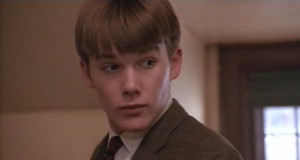
One of my students just asked me how his hero could gain courage. This question goes to heart of character arcs so I thought I’d share my response.
The two fundamental character flaws: lack of courage or lack of compassion
I remember arcing up in Lynda Heys’ screenwriting course years ago when she said that characters only have two flaws: lack of courage or lack of compassion. But after years of reflection, I’ve come to appreciate that she’s basically right. You get variations on a theme but when a coward becomes brave or a taciturn brute opens their heart there is a powerful resonance that moves us all. But how do they make this transition? Hence my student’s question:
How does one gain courage ? What does a character have to go through to master their fears? I had the thought that it can either be a life threatening trauma that they survive or a resolution or realisation about life that gives a higher state of mind that allows them to objectify the fear and defeat it.
Character arc doesn’t sit outside the story arc
When screenwriters start out, they know they need to have a story arc. Then they find out that their heroes have to have a character transformation as well. However, the mistake they often make is to have those 2 arcs unrelated. So, they contrive something outside the main narrative that allows the hero to come back and grab the prize. That’s not how it should work.
The story arc drives the character arc
In a good story, the character arc doesn’t sit apart from the main story. The main story drives the character arc. It goes like this:
Hero has flaw.
Hero wants prize.
Hero is prevented from getting the prize because of his flaw.
Hero wants prize so badly – needs prize so badly – they are forced to confront their flaw, in a life and death situation (literal or metaphoric), face it down, and grab the prize.
How does the hero gain courage?
So what transforms the hero? The story transforms the hero. It brings them to a position where they are forced to choose the hard, new way and proceed further in their quest – or fall back on their old ways and fail.
When does the hero gain courage?
When does this moment happen in the overall structure of the film? In the Ordeal – step 8 of the Hero’s Journey. This is where the hero experiences this life and death moment that highlights their flaw and demands that they change if they want to progress.
How Billy Wilder did it in The Apartment
In Bill Wilder’s The Apartment, CC Baxter (Jack Lemmon) lacks courage. When his superiors ask to use his apartment for liaisons with their floozies, he’s not strong enough to say no. In return, they promote him. What ultimately gives him the courage to take a stand, and turn his back on his career? The Ordeal.
He returns to his boss a broken compact mirror he’s found in his apartment only to see Miss Kubelick using the same compact mirror. That’s a metaphoric death. He has wanted to advance his career and get Miss Kubelick – but in that moment he knows that he can’t have both. Want the girl? You’re going to have to change, old Buddy boy!
Later, he’ll get to show us the brave choice he’s made when he refuses to give his apartment key to his boss – and walks out on his job. His moment of Resurrection.
How Todd transforms in Dead Poets Society
In Dead Poets Society, Todd (Ethan Hawke) lacks courage at the start of the film. What transforms him? His Ordeal.
Mr Keating (Robin Williams) forces him to stand at the front of the class and compose a poem – Todd’s greatest fear. But he confronts those fears and conjures “the sweaty toothed madmen”. He’s transformed.
Later, he gets to show us the new Todd when Keating has been made a scapegoat for Neil’s suicide. Knowing he’ll incur the wrath of his parents and be expelled, he steps up onto his desk and exclaims, “Oh, captain, my captain”. Resurrection.
How Phil Connors is transformed in Groundhog Day
Bill Murray’s character doesn’t lack courage in Groundhog Day – he lacks compassion. But again it’s his Ordeal that transforms him.
Having tried to bed Rita (Andie McDowell) by foul means, and been slapped on the face a hundred times, he tries to kill himself but every day wakes up to “Put your little hand in mine, there ain’t mountain I can’t climb, I got you, babe”. Can’t fulfil his goal because of character flaw, life and death moment, transformation.
Align your character arc with your story – and force your character to evolve or perish
So the secret to transforming your hero is to make sure your story brings them to a point – about 3/5 of the way through the film – where they can no longer proceed in their quest without confronting their flaw. Make it hard for them. Really hard. Make it their greatest fear. Their point of greatest vulnerability. Then, in overcoming that fear, they will be transformed as characters – and have won the hearts of your audience.